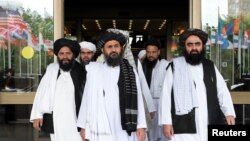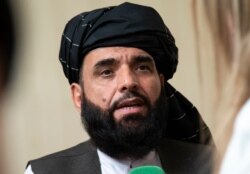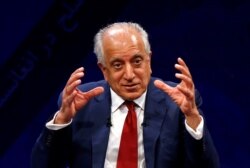The Taliban said Friday its latest meetings with representatives of the United States in Qatar have discussed the signing of a peace deal between the two adversaries to end their 18-year-old Afghan war.
The insurgent group's assertions come two days after its political envoys in the Qatari capital, Doha, offered a brief partial cease-fire in a bid to end the latest deadly violence in their troubled direct dialogue with American interlocutors.
The Taliban negotiating team's spokesman, Suhail Shaheen, said on Twitter that both sides discussed "matters related to the ceremony of the signing of the agreement" in meetings over the past two days.
He described as "productive" the discussions with the U.S. team being led by Afghan-born veteran American diplomat Zalmay Khalilzad. "(The) talks will continue for several days."
Shaheen did not comment on the Taliban's reported offer of a limited cease-fire. It was also not clear for how long the insurgents intended to scale back their violent activities, though reports said the duration could be up to 10 days.
There were no immediate comments from the U.S. side on the insurgent claims of progress in talks or whether the offer of a limited cessation in hostilities was acceptable to them.
Khalilzad had paused the talks last month, demanding the Taliban reduce battlefield hostilities before his team returned to the table to conclude the peace process.
Insurgent sources say the U.S. envoy has been staying in Doha for days to hear from the Taliban on his demand, although Khalilzad's office has been silent about his presence in the Gulf nation.
The Afghan government, which is kept out of the U.S.-Taliban talks, Friday reiterated its opposition to the Taliban's reported offer of a reduction in violence, saying an extensive cease-fire could only test the insurgent group's seriousness and further the peace effort.
"A cease-fire is the only way to achieve sustainable and dignified peace which is the demand of the people and the government of Afghanistan," the deputy presidential spokesman, Dawa Khan Mina Pal, told VOA.
If signed, the U.S.-Taliban deal would lead to a gradual withdrawal of more than 13,000 American troops along with thousands of coalition partners in return for the Taliban's assurances Afghan soil would not be allowed to be used for international terrorism.
Additionally, the Taliban would be bound to immediately open negotiations with Afghan stakeholders, including the government in Kabul, on permanently ending nationwide hostilities and negotiating a power-sharing deal to govern post-withdrawal Afghanistan.
Pakistan: 'Major development'
Pakistan, which is credited with arranging the U.S.-Taliban talks — mostly held in Qatar — disclosed on Thursday the insurgent group had agreed to a reduction of violence to move the peace process forward.
"Today a major development has taken place in this effort. The Taliban has accepted the demand for a reduction in violence," said Pakistani Foreign Minister Shah Mehmood Qureshi in a video statement. He is currently visiting Washington and is scheduled to hold official meetings with senior Trump administration officials.
Pakistan was one of only three countries to recognize the five-year Taliban government in Kabul before that government was ousted by a U.S.-led military invasion of Afghanistan in 2001 for sheltering al-Qaida leaders blamed for plotting the terrorist strikes against America that year.
The Pakistani spy agency is accused of covertly supporting the Taliban insurgency. Officials in Islamabad deny the charges but acknowledge that areas in Pakistan still hosting nearly 3 million Afghan refugees could be serving as a hiding place for insurgents.






